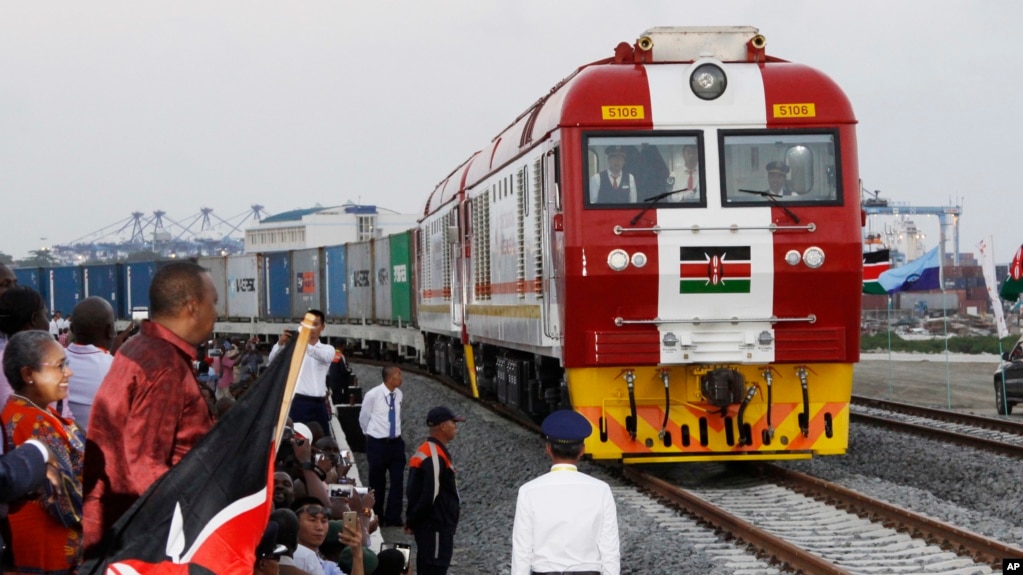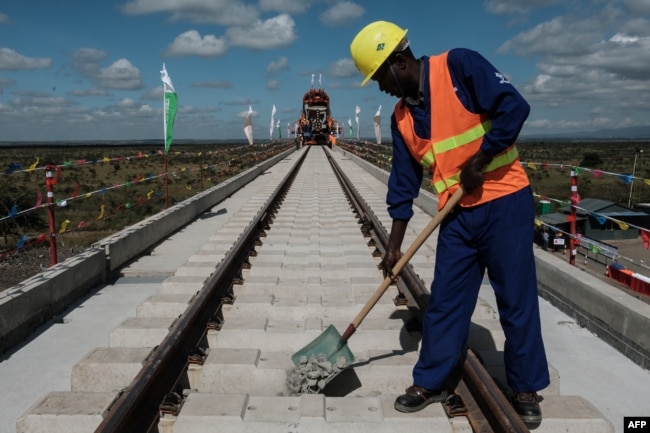China Colonizing Africa
"These guys are trying to take us back to those days [of colonialism]."
"Some day I will tell my son that when you were young, I was despised because I was black."
Richard Ochieng', 26, Kenyan university graduate
 |
| Kenyan President Uhuru Kenyatta watches a cargo train carrying port containers begin its opening run from Mombasa to Nairobi, Kenya, May 30, 2017. The project was financed by China. |
Kenya is home to over 40 officially recognized ethnic groups. As such, there are invariably ethnic tensions. Mass violence was seen for a number of weeks through a 2007 disputed election caused by ethnic disagreements. Kenyans of Indian and Pakistani origin feel excluded from mainstream Kenyan life, despite having been granted greater official recognition through a government initiative, to bring them into the mainstream.
Now, there is an added element of irritation introduced with the entry of China as a major investor in Africa. In the last decade, China has erected infrastructure across Africa, and loaned funding for various projects. Many African nations borrow from China to pay for these upgrades in their aging infrastructure. Or they rely on natural resources as exchange with China. Rising debts as a result are seen as a disturbing reality.
On the other hand, there are also concerns relating to the exploitative labour practices exercised by some Chinese companies. In Nairobi, however, there are growing concerns related to discrimination. Of the estimated 40,000 Chinese established in Kenya, there for a few years, many live in housing complexes, bused back and forth from work, their isolation leaving little opportunity for social interaction with Kenyans.
Along with the fact that many of the Chinese come to Africa bringing with them hierarchical attitudes relating to culture and race. Africans appear at the bottom of that pyramid, according to former New York Times correspondent Howard French, author of the book "China's Second Continent", outlining lives of Chinese settlers in Africa.
 |
| Demonstrators protest the route of the Standard Gauge Railway (SGR) being built by the Chinese government, which is to cut through the middle of the Nairobi National Park, at a rally outside the People’s Republic of China Embassy in Nairobi |
A symbol of Chinese-Kenyan cooperation can be seen in a 480-kilometer Chinese-built railroad running between Nairobi and Mombasa. The Standard, a Kenyan newspaper in July wrote of an atmosphere of "neocolonialism" among Kenyan railway workers under Chinese management where demeaning punishment has occasionally been meted out. Kenyan engineers, moreover, are prevented from driving the train, other than for occasions of show when journalists are present.
Richard Ochieng' began working for a Chinese firm in Ruiru, a settlement at the edge of Nairobi, for a Chinese motorcycle company. He worked as a salesman, finding the pay a fraction of what he had been offered when he was hired. Discovering as well that his salary was subject to deductions for infractions. "No laughing" was a company rule. Any employee 15 minutes late for work could be docked five or six hours' pay.
One of his managers, Liu Jiaqi, 26, was generally good-natured, according to Mr. Ochieng', but if something went awry his subordinates heard about it in insulting measure. When Mr. Ochieng' protested, as for example when the two were on a sales trip and sighted a band of baboons, his supervisor said "Your brothers". Mr. Ochieng' was taken aback, he complained, but the monkey comments kept on coming. When Mr. Ochieng' asked why his boss was angry with him, the response was, "Because you are Kenyan".
All Kenyans, Mr. Liu elaborated, even the country's president, are "like a monkey". Humiliated, outraged, he decided he would record one of the rants, and recorded his boss declaring that Kenyans were "like a monkey people". The video was put on line and widely circulated. Seen by Kenyan authorities, they had the man returned to China. But therein lies a problem; Kenyans now wonder whether their country has welcomed foreigners to shape the country's future and in the process bringing their racist attitudes with them.
"As much as we want their money, we don't want them to treat us like we are not human in our own country", stated 30-year-old David Kinyua, who manages an industrial park in Ruiru, home to the motorcycle company which employs Mr. Ochieng'.
 |
| A Kenyan worker lays gravel at a construction site for the Standard Gauge Railway (SGR) in Nairobi, Kenya, June 23, 2018. |
Labels: Africa, China, Investment, Kenya, Racism

<< Home